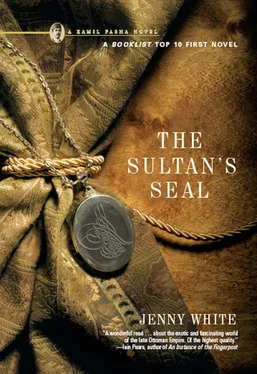Jenny White - The Sultan's seal
Здесь есть возможность читать онлайн «Jenny White - The Sultan's seal» весь текст электронной книги совершенно бесплатно (целиком полную версию без сокращений). В некоторых случаях можно слушать аудио, скачать через торрент в формате fb2 и присутствует краткое содержание. Жанр: Исторический детектив, на английском языке. Описание произведения, (предисловие) а так же отзывы посетителей доступны на портале библиотеки ЛибКат.
- Название:The Sultan's seal
- Автор:
- Жанр:
- Год:неизвестен
- ISBN:нет данных
- Рейтинг книги:5 / 5. Голосов: 1
-
Избранное:Добавить в избранное
- Отзывы:
-
Ваша оценка:
- 100
- 1
- 2
- 3
- 4
- 5
The Sultan's seal: краткое содержание, описание и аннотация
Предлагаем к чтению аннотацию, описание, краткое содержание или предисловие (зависит от того, что написал сам автор книги «The Sultan's seal»). Если вы не нашли необходимую информацию о книге — напишите в комментариях, мы постараемся отыскать её.
The Sultan's seal — читать онлайн бесплатно полную книгу (весь текст) целиком
Ниже представлен текст книги, разбитый по страницам. Система сохранения места последней прочитанной страницы, позволяет с удобством читать онлайн бесплатно книгу «The Sultan's seal», без необходимости каждый раз заново искать на чём Вы остановились. Поставьте закладку, и сможете в любой момент перейти на страницу, на которой закончили чтение.
Интервал:
Закладка:
“What about your friend?”
Mary stared at the dark window for a long moment before answering. “She’s the one who told them where to look. She sold me for a few pence.”
I didn’t see why men would pay to see women kiss. Perhaps in England women were kept hidden as they are among the Ottomans, and unscrupulous men paid to look at them.
“People heard about what happened anyway. They went around bragging about what they had done. No one would hire me. I lost everything.” I could hear Mary quietly crying, her face in shadow. “The wife of the minister of our church took pity on me and gave me a good reference, but only if I promised to reform. So I came out here.”
I leaned over and caressed the silken filaments of her hair. She let me stroke her hair, as she had my cheeks. She was lovely, taut, confused. I thought to gentle her in the way among women.
When after a while she touched her lips to mine, I misunderstood and she fell back.
“You startled me,” I said.
“It’s only a kiss,” she said breathlessly. “Won’t you let me?”
“You are right,” I admitted, ashamed of having repulsed her. “There is no shame among women, only comfort.”
We smiled bashfully at one another, our faces close enough to see in the gloom. I allowed her to kiss my mouth, then my neck. It reminded me of the balm that ran through me when Violet calmed my fears as a child and, after Hamza no longer visited, eased my sorrow. I had not desired Violet’s pity since Amin Efendi’s shameful attack, but this pale woman’s touch brought me back to my body. It is a blessing of womanhood that we may gather strength and pleasure from one another.
Like a mariner in uncharted seas, her hand traced the pulse in my throat to the top of my breasts, sheathing them in flames. Our lips lay together as twins. I felt myself arching back against the cushions as her hands pulled away the layers of cloth between us.
“Never strangers,” she breathed into my ear. “Not from the very beginning.”
She did not speak again, not even when I lay shuddering in her arms, my body her supplicant.
This was not the bread and water of Violet’s caress, but a veneration.
AFTER THAT WE resumed our weekly meetings. As the months passed, I thought less and less about Hamza, who did not come again. Instead, I savored the unfamiliar sensations of my first real friendship with a woman. Mary rented a carriage and we went for drives through the autumn countryside. When we discovered the abandoned sea hamam, we began to go there for our picnics. The driver returned at a given time or waited, snoring, by the road.
I unstacked the copper warming pots and laid them in a circle on the table. We threw a fringed cotton blanket on the mattress to cover the damp boards. Our bare feet hung in pairs, hers pale as milk, mine the color of fine china. As always, Mary had brought coal and kindled a small fire in the brazier. The jewelry I had given her winked from the shadows as she heated water for tea. From a corner nook, I extracted two tea glasses, the cheap kind bought in the market.
Perched on the mattress under a quilt, we fed each other pockets of flaky dough stuffed with cheese and parsley, tart fingertips of grape leaves rolled around rice and currants, fragrant bread kept hot in the tinned copper pans. After we ate, we smoked cigarettes and threw the remnants from the shady portico into the bright captive square of water. In another season these walls would hold the racket of children’s calls, shrill volleys of sound amid the placid murmur of their mothers’ voices telling and retelling. Their legs shyly entering the sea up to the ribbon at the knee. Bathing costumes worn like daring fashion gowns. The vulnerable body quickly pressed between plush towels so it did not sicken from a draft.
But not yet. It was still our sun and sea, our banging shutters, our sighing under the weathered boards. We lay still like split mussels, gathering a crust of salt. Her yellow hair was cut short, like a boy’s, and when she slicked it back wet, her face became naked.
31
To Sybil’s surprise, it is not difficult to arrange to see Shukriye. The women’s gatherings buzz with the news that she is staying with her sister, Leyla. The women prepare to visit the house in droves to offer sympathy to the sisters, whose father lies dying, and to assuage their curiosity about this member of their society so long gone. On the family’s first receiving day, Sybil joins the assault of the concerned and curious. Sybil hears the woman beside her whisper to a neighbor that Shukriye has borne three children, but that only one survives, a boy, just two years old.
“Mashallah, by the will of Allah,” the other woman answers in surprise, turning her head and looking appraisingly at Shukriye. “The poor woman. But at least she has a son.”
Shukriye, a plump woman in a caftan of exquisite brocade, sits on the divan, her face half hidden behind the wings of a gauze scarf that hangs to her breast. Sybil can see that her eyes are red from weeping. Shukriye’s sister, Leyla, keeps up the formal greetings and directs the servants to offer the guests tea, cakes, and savories from large silver trays. Another servant stands in the corner with a small stove and implements, ready to make coffee for anyone desiring it.
Sybil notices Asma Sultan’s daughter, Perihan, sitting next to Shukriye, her hand occasionally reaching to smooth Shukriye’s robe. She remembers that Shukriye had been engaged to the man Perihan wanted to marry. Perhaps, she thinks, they are united as friends in sorrow at his death.
An old woman in a corner of the divan by the window moves her head rhythmically side to side, intoning a litany of prayer, interspersed with loud sighs and appeals to Allah.
“That is Shukriye’s grandmother.”
“May Allah protect her. She is praying for her son.”
There is a commotion among the women, a rising whisper and flurry of silk as they make way for a tall eunuch that Sybil recognizes as the one that had ushered her into Asma Sultan’s house. The women fall silent. Behind him, Asma Sultan enters the room. She looks tired and older than Sybil remembers from the circumcision party two weeks before. She is dressed in a tight-waisted European gown and walks stiffly past the row of women in loose Turkish robes propped comfortably on the divan.
Leyla hurries toward her, arms extended in welcome. Signaling to Shukriye and Perihan to follow her, she leads Asma Sultan into an adjoining private room. As Asma Sultan passes Sybil, she stops and, with an amused smile, gestures that she should come with them. This occasions a flurry of whispers among the other visitors. The eunuch waits beside the door, arms folded, and when the five women have passed through, closes it behind them.
Sybil finds herself in a sitting room furnished only with a low cushioned divan around three sides of the room. In the middle is a carpet of cheerful colors on which are scattered small low tables of wood inlaid with ivory and mother-of-pearl. The windows behind the divan open onto the Bosphorus, quaking with light. She hears the sad query of a dove from the garden.
Asma Sultan is given the seat of honor in the corner of the divan, Perihan beside her. With a curious look, Leyla seats Sybil to Asma Sultan’s left.
This is followed by the formalities of introduction and inquiries about health. Servant girls bring refreshments, then withdraw. Shukriye slumps on the divan. She does not eat or speak beyond the required formulaic responses.
Finally, Asma Sultan asks, “What is the matter with her?” To Shukriye she says encouragingly, “Pull yourself together, dear girl, and tell us what has befallen you in these eight years since we last saw you.”
Читать дальшеИнтервал:
Закладка:
Похожие книги на «The Sultan's seal»
Представляем Вашему вниманию похожие книги на «The Sultan's seal» списком для выбора. Мы отобрали схожую по названию и смыслу литературу в надежде предоставить читателям больше вариантов отыскать новые, интересные, ещё непрочитанные произведения.
Обсуждение, отзывы о книге «The Sultan's seal» и просто собственные мнения читателей. Оставьте ваши комментарии, напишите, что Вы думаете о произведении, его смысле или главных героях. Укажите что конкретно понравилось, а что нет, и почему Вы так считаете.












